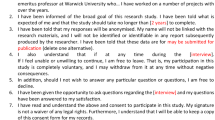Conclusion
The future for the field of community psychology is promising as we visualize that our key resources are citizens, colleagues in pyschology, and those persons in the social sciences who share a commitment to collaborative research.
An antidote for coping with the regal quality of our scientific heritage and the discomfort about not being able to reduce the barriers between research and practice is to develop an investigative style that makes inquiry not just a right or privilege but makes community research a genuinely collaborative process. Without such collaboration our ideas run the risk of being sterile and our impact puny and shallow. With such collaboration researchers and citizens have the opportunity to generate a style of work that will contribute to our own personal development and to the evolution of our social setings.
As a distinct bonus we can construct a philosophy for our work that is truly democratic — where research and practice are integrated by a process of conjoint ownership. In this sense, the interdependence of research and practice can be realized: for the science, for the profession, and for the citizens of community psychology.
Similar content being viewed by others
References
Argyris, C. (1985). In E. E. Lawler, III, et al.,Doing research that is useful for theory and practice. San Francisco: Jossey-Bass.
Caplan, N., & Nelson, S. D. (1973). On being useful: The nature and consequences of psychological research on social problems.American Psychologist, 28, 199–211.
Chavis, D. M., Stucky, P. E., & Wandersman, A. (1983). Returning basic research to the community: A relationship between scientist and citizen.American Psychologist, 38, 424–434.
Fox, D. R. (1985). Psychology, ideology, utopia, and the commons.American Psychologist, 40, 48–49.
Fox, D. R. (1986). Beyond individualism and centralization.American Psychologist, 41, 231–232.
Howard, G. S. (1985). The role of values in the science of psychology.American Psychologist, 40, 255–265.
Manicas, P. T., & Secord, P. F. (1983). Implications for psychology of the new philosophy of science.American Psychologist, 38, 399–413.
Rappaport, J. (1981). In praise of paradox: A social policy of empowement over prevention.American Journal of Community Psychology, 7, 649–664.
Rubinstein, R. A. (1981). Toward the anthropological study of cognitive performance.Human Relations, 34, 677–703.
Rubinstein, R. A. (1984). Epidemiology and anthropolgy: Notes on science and scientism.Communication and Cognition, 17, 163–185.
Samuelson, C. D., Messick, D. M., Allison, S. T., & Beggan, J. K. (1986). Utopia or myopia? A reply to Fox.American Psychologist, 41, 227–229.
Sampson, R. E. (1978). Scientific paradigms and social values: Wanted-a-scientific revolution.Journal of Personality and Social Psychology, 36, 1332–1343.
Sarason, S. B. (1976). Community psychology, networks, and Mr. Everyman.American Psychologist, 31, 317–328.
Stern, P. C. (1986). Toward a social psychology of solidarity.American Psychologist, 41, 229–231.
Tyler, F. B., Pargament, K. I., & Gatz, M. (1983). The resource collaborator role: A model for interactions involving psychologists.American Psychologist, 38, 388–398.
Wandersman, A., Chavis, D., & Stucky, P. (1983). Involving citizens in research. In R. Kidd & M. Saks, (Eds.),Advances in applied social psychology (Vol. 2). Hillsdale, NJ: Erlbaum.
Author information
Authors and Affiliations
Additional information
Invited Address requested by the Social Ecology Interest Group of the Division of Community Psychology (Division 27), of the American Psychological Association. The address was given on August 24, 1985, at the 93rd annual meeting of the American Psychological Association, Los Angeles, California.
Robert L. Burgess, Fern Chertok, Robert A. Rubinstein, Myrna Beth Shure, and David Mark Todd read drafts of the address and gave me helpful and challenging reviews. I am grateful to them! The following persons also, in conversations or reading early drafts, gave me editorial and substantive suggestions. My appreciation is expressed to Dirk Bethe, Paul Dalinko, Nancy Dassoff, Jack Glidewell, Michael Holz, Phil Mann, Dan Romer, Janice Schreckengost, Lonnie R. Snowden, Steve Stelzner, Dan Stokols, Dave Tobin, Ed Trickett, Trudy Vincent, and Marc Alan Zimmerman.
Rights and permissions
About this article
Cite this article
Kelly, J.G. Context and process: An ecological view of the interdependence of practice and research. Am J Commun Psychol 14, 581–589 (1986). https://doi.org/10.1007/BF00931335
Issue Date:
DOI: https://doi.org/10.1007/BF00931335




